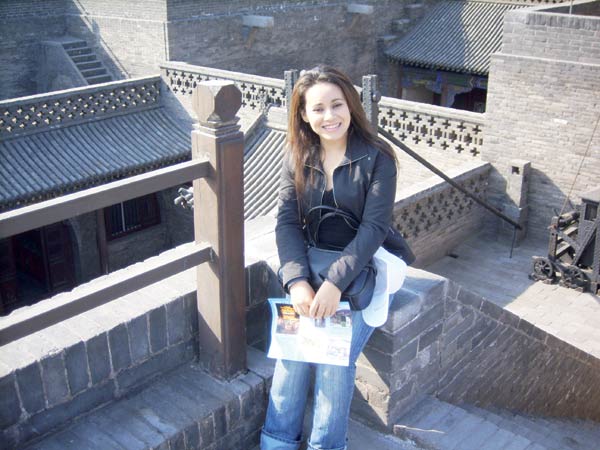

|
 Belhadj Imen's obsession with China has led her to come and study in the country. Provided to China Daily |
When Belhadj Imen came to China in 2005 she was fuelled by her language studies, a love of history and childhood tales of the Great Wall. But it was a performance that paved the way for her passage to the country with which she had been so fascinated.
Now a fourth-year PhD student at Peking University, researching relations between China and the Maghreb, Imen arrived in China in 2005 after winning first prize in a competition organized by the Hanyuqiao Project (which promotes Chinese language and culture).
Before coming to China, Imen was studying Chinese at university in Tunisia.
She was among 75 people from 39 countries in the competition and needed to do something to stand out from the crowd.
As most participants chose to sing Chinese songs, she took something different - Peking Opera.
"Peking Opera is really a beautiful art if you take a look at the performers' gestures and the expression in their eyes, but it is difficult to learn," Imen says.
Imen's interest in Chinese history began when she was just 8 years old.
"I was told by my parents that the Great Wall is the only manmade structure that can be seen from the moon, and it is in China," Imen says.
She was obsessed with China from then on, even though the Great Wall cannot really be seen from space. In her first year of the university, she dropped her original major in forest engineering and transferred to another university to study Chinese.
Her competition win came at a perfect time, during the summer of her graduation. First prize was funding from the Chinese government for a master's degree in Chinese literature at Peking University.
In 2006 Imen began to think about a PhD in Sino-African relations, after taking part in the Forum on China-Africa Cooperation in Beijing.
She decided to focus on relations between China and the Maghreb region in northwest Africa, both because it is where she's from and because there was a lack of research into its relations with China.
Imen speaks five languages - French and Arabic, which she learned at school, German, which she studied at high school, English and now Chinese.
Despite her linguistic background, she found Mandarin study difficult in the beginning. Talking with her Chinese teachers outside of class also improved her speaking.
"I became the tour guide for my Chinese teachers, taking them to interesting places in my hometown, and they would correct my pronunciation during our conversations," she says.
"Campus life in Beijing is different from Tunisia," Imen says. "I was restricted to my life at home and school in Tunisia, but I made a lot of friends and joined many club activities in Beijing."
She is now secretary-general of the African Students' Association at Peking University, and she also delivers speeches on the history of the Maghreb region.
"I am very interested in history as it is a subject full of mystery," she says. "Whenever I come to a historical site, I imagine how people lived there during the old times, and I think about what they wore and ate."
Imen's hometown, Sidi Bou Said, is in northern Tunisia, close to the ancient city of Carthage.
"My hometown is a famous tourist spot, and I found China has many places for traveling too," she says.
"Guilin is my favorite place, as it has the most beautiful natural scenery in the world."
Imen hopes in the future to establish a research center in Chinese studies in Tunisia.
There is only one research center for Chinese studies in Africa, and that's in South Africa, she says. "Other research centers doing Asian studies tend to focus on Japan, and it would be meaningful to have more research centers in Chinese studies established in Africa."
liaoxue@chinadaily.com.cn